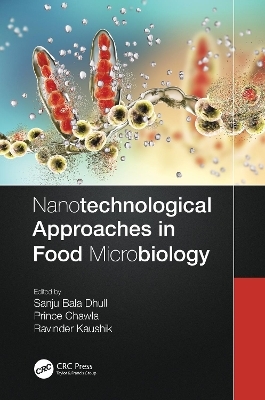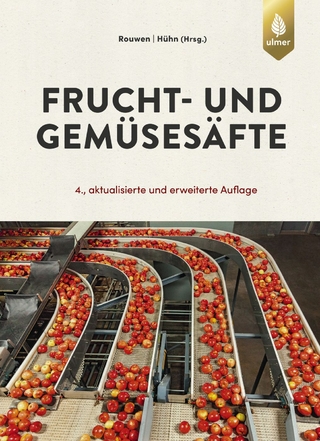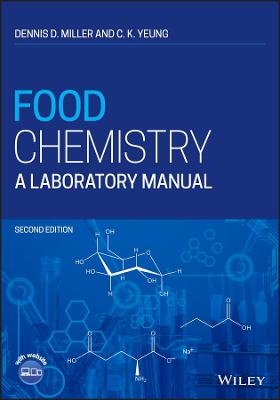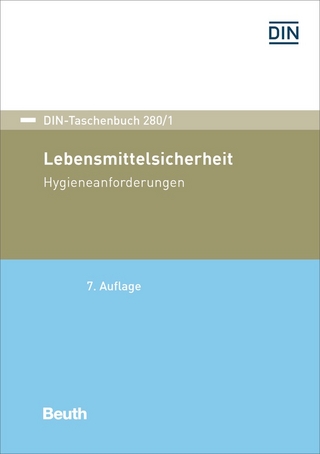
Nanotechnological Approaches in Food Microbiology
CRC Press (Verlag)
978-0-367-64293-8 (ISBN)
Nanotechnology has gained attention in all aspects of modern science, having vital applications in the food chain, storage, quality monitoring, processing, preservation, and packaging. The global population is increasing rapidly, therefore there is a requirement to produce food products in a more proficient, non-toxic, and sustainable way. Food scientists and microbiologists are interested in food safety and quality assurance to produce excellent-quality food free of food pathogens
Nanotechnological Approaches in Food Microbiology provides a systematic introduction and comprehensive information about practical approaches and characteristic features related to the significant applications of nanotechnology in food microbiology, including, nano-starch films, nanoemulsions, biogenic nanoparticles, and nanocapsules. The book will explore details about metal nanoparticle synthesis, characterization, mathematical modeling, kinetic studies, and their antimicrobial approaches.
Key Features:
Includes comprehensive knowledge on metal nanoparticle synthesis, characterization, mathematical modeling, kinetic studies and their antimicrobial approaches
Lays out concepts of essential oil nanoemulsion and their potential antimicrobial applications
Deals with the latest development in nano-starch composite biofilms containing bioactive constituents to inhibit pathogenic microbes
Explores the nanocapsules as potential antimicrobial agents in food.
Provides information regarding new biogenic nano-antimicrobials developed for the food safety and quality assurance
This book will educate readers on the aspects of nanotechnology in food safety and quality assurance. Nanoemulsions, nanohydrogels, metal nanoparticles, nano-starch films, nanocapsules and nano-antimicrobials are the emerging essentials of nanotechnology that are used to preserve the food at greater extent. This book should be of interest to a large and varied audience of researchers in academia, industry, food processing, preservation, packaging, microbiology and policy regulations.
Sanju Bala Dhull, Ph.D., is presently working as Senior Assistant Professor in Department of Food Science and Technology, Chaudhary Devi Lal University, Sirsa, having more than 12 years of teaching and research experience. Her area of interests includes synthesis and characterization of nanoparticles, nanoemulsions and antimicrobial activity of nanoformulations in food and characterization of biomolecules. She has published more than 20 research papers in journals of national and international repute. She presented more than 20 research paper in various national and international conferences. She is an active member of Association of Food Scientists and Technologists (India) and Association of Microbiologists of India. She also serves as reviewer of several national and international journals. Prince Chawla, Ph.D., is currently working as Assistant professor in Food Technology and Nutrition (School of Agriculture), Lovely Professional University, Phagwara, Punjab. He is an alumnus of Chaudhary Devi Lal University, Sirsa, and Shoolini University, Solan. He has a chief interest in mineral fortification, functional foods, protein modification, and the detection of adulterants from foods using nanotechnology. He has worked in the ‘Department of Biotechnology’ and ‘Department of Science and Technology’ funded research projects and has four years of research experience. He has 3 patents, 2 books, 30 international research papers, 7 international book chapters. He is a recognized reviewer of more than 30 international journals and reviewed numbers of the research and review articles. . Ravinder Kaushik, Ph. D., is presently working as Senior Assistant Professor , Amity University, Noida (UP). He also served the School of Bioengineering and Food Technology, Shoolini University, Solan for about six years. He is an alumnus of the National Dairy Research Institute, Karnal, and an eminent researcher whose chief interests lie in Post-Harvest Technology, Dairy Processing, food processing, food chemistry, and new product development. He is editor in two international Journals "International Journal of Food and Fermentation" and "International Journal of Food and Nutrition" and referee in more than 30 Journals. He has 9 patents, 2 books, 3 compendium, 36 International Research papers, 11 National papers, 4 International Book chapters, 10 National book chapters. He guided 27 Masters students, 1 M.Phil student 3 Ph.D. students. He is a member of the Science Advisory Board, USA as well as appointed as Expert for Assessing grant proposals by "The National Center of Scientific and Technical Evaluation (NCSTE) in Kazakhstan. He is also a member of "Mendeley Advisor Community"
Chapter 1. Mathematical Models and Kinetic Studies for the Assessment of Antimicrobial Properties of Metal Nanoparticles. Chapter 2. Mushroom Extract–Reduced Metal Nanoparticles: An Effective Approach Against Food Pathogenic Bacteria. Chapter 3. Antimicrobial Efficacy of Neem Extract–Stabilized Metal Nanoparticles. Chapter 4. Metal Nanoparticles of Microbial Origin and Their Antimicrobial Applications in Food Industries. Chapter 5. A Way Forward With Nano-Antimicrobials as Food Safety and Preservation Concern: A Look at the Ongoing Trends. Chapter 6. Biogenic Nanoparticles: A New Paradigm for Treating Infectious Diseases in the Era of Antibiotic Resistance. Chapter 7. Nanoparticles and Antibiotic Drug Composite: A Novel Approach Towards Antimicrobial Activity. Chapter 8. Nanoemulsions of Plant-Based Bioactive Compounds: Synthesis, Properties, and Applications. Chapter 9. Essential Oil Nanoemulsions: As Natural Antimicrobial Agents. Chapter 10. Nanoemulsions Formulated With Cinnamon Oil, and Their Antimicrobial Applications. Chapter 11. Applications, Formulations, Antimicrobial Efficacy and Regulations of Essential Oils Nanoemulsions in Food. Chapter 12. Antimicrobial Efficacy of Essential Oil Nanoemulsions. Chapter 13. Nanotechnologies in Food Microbiology: Overview, Recent Developments, and Challenges. Chapter 14. Nanocapsules as Potential Antimicrobial Agents in Food. Chapter 15. Nano-Starch Films as Effective Antimicrobial Packaging Material. Chapter 16. Starch Bio-Nanocomposite Films as Effective Antimicrobial Packaging Material. Chapter 17. Biogenic Metal Nanoparticles and Their Antimicrobial Properties. Chapter 18. Enhanced Antimicrobial Efficacy of Essential Oils–Based Nanoemulsions. Chapter 19. Nano-Starch Films as Effective Antimicrobial Packaging Materials.
| Erscheinungsdatum | 12.09.2024 |
|---|---|
| Zusatzinfo | 32 Tables, black and white; 18 Illustrations, color; 39 Illustrations, black and white |
| Verlagsort | London |
| Sprache | englisch |
| Maße | 156 x 234 mm |
| Gewicht | 911 g |
| Themenwelt | Technik ► Lebensmitteltechnologie |
| ISBN-10 | 0-367-64293-X / 036764293X |
| ISBN-13 | 978-0-367-64293-8 / 9780367642938 |
| Zustand | Neuware |
| Haben Sie eine Frage zum Produkt? |
aus dem Bereich


